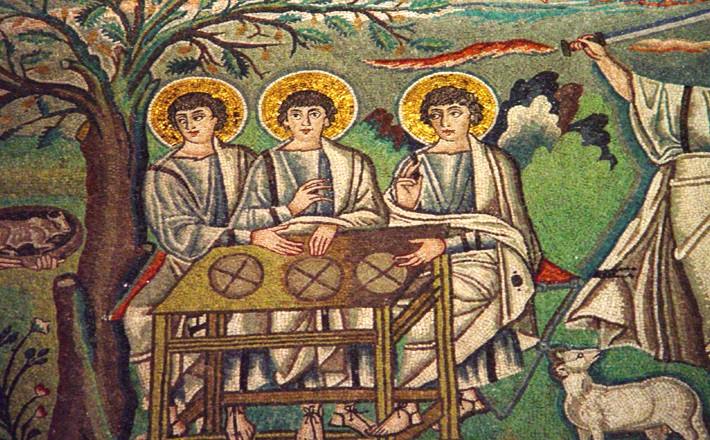Commentary on Exodus 19:2-8a
In Exodus 19, the children of Israel arrive at the beginning place, Mount Sinai.
Their arrival marks the fulfillment of the promise God made to Moses at the burning bush: “I will be with you; and this shall be the sign for you that it is I who sent you: when you have brought the people out of Egypt, you shall worship God on this mountain” (Exodus 3:12). The promise has come full circle, and, yet, the true journey is just beginning: the covenant relationship between Israel and God.
The first eighteen chapters of Exodus create the setting for the covenant. From the desperate situation of the Israelite slaves in Egypt to their miraculous rescue at the Sea and their terrible hardships in the wilderness, God has met their needs every step of the way. A point God makes in this reading: “You have seen what I did to the Egyptians, and how I bore you on eagles’ wings and brought you to myself” (19:4). This is a point that will be driven home time and again throughout the Pentateuch. It is the basis for the Decalogue: “I am the Lord your God, who brought you out of the land of Egypt, out of the house of slavery…” (20:2). God has proven to be powerful and dedicated to the well-being of the children of Israel as they’ve journeyed to the foot of this holy mountain. The covenant made at Sinai is thus born and nurtured in a matrix of trust and steadfast love.
The content of the covenant unfolds in the chapters that follow. In 19:5-6, the specifics of the covenant are only alluded to: “if you obey my voice and keep my covenant” and “you shall be for me a priestly kingdom and a holy nation.” These statements make clear that the people will be required to adopt particular behaviors and to follow certain laws as part of the covenant relationship. The purpose of adopting these laws is nothing less than transformation. Look at Deuteronomy 28:15-16: “[T]oday the Lord has obtained your agreement: to be his treasured people, as he promised you, and to keep his commandments; for him to set you high above all nations that he has made, in praise and in fame and in honor; and for you to be a people holy to the Lord your God, as he promised.” Obedience to the covenant promises to change the people from helpless slaves to “a people holy to the Lord your God.”
Deuteronomy 28:15 uses the image of the children of Israel as a “treasured people” and our reading from Exodus 19 calls on them to be a “treasured possession” (Exodus 19:5). In both cases, the language of being “treasured” (see also Deuteronomy 7:6; 14:2; 26:18-19; Psalm 135:4) indicates that God accords them a place of special honor among the nations and that the people are to guard their relationship with God above all.
“Relationship” is the key word here. The laws of the covenant establish a dynamic between the people and God that, as Terence Fretheim puts it, is “maximally responsive.”1 The relationship already exists. It was born in the promises made to their ancestors. God was true to those promises when the people cried out in slavery (Exodus 2:24-25). The covenant takes the relationship one step further in seeking to create a nation that is empowered to respond to God’s generous and faithful care. The laws of the covenant will set up a framework for the way the people are to conduct themselves with God and each other. The Decalogue in Exodus 20 is the simplest example of this point with its laws regulating both divine and human relationships. Within this frame, relationships with God and with each other have the opportunity to thrive and to flourish.
For some, using the language of law or covenant or obedience tends to bring up old conversations about “Law and Gospel.” Also, the promise “if you obey my voice and keep my covenant, you shall be my treasured possession out of all the peoples” might sound to some too similar to the promises of those who preach the Prosperity Gospel. Covenant texts do make bold promises based on adherence to the law. The promise, however, that abundant life grows when we are devoted to God and to each other is not preposterous but wise. It is also a wise recognition of human limitations to recognize that only the grace of God makes abundant covenantal life possible.
This reading from Exodus empowers a preacher to call people to Christian community by casting a vision of the life that is possible when we devote ourselves to the relationships we share with God and with each other. Such a devotion will involve immersing ourselves in the communal practices of the church. It will require us to examine the habits of our lives in order to discern which of these habits help and which ones hinder us as we seek to grow as a people dedicated to God and each other. Both of these disciplines will lead to nothing less than the deep fulfillment and healing that are characteristic of abundant life. It is to this vision of abundant life that the people of Israel respond enthusiastically in verse 8: “Everything that the Lord has spoken, we will do!”
Notes:
1. Terence Fretheim, Exodus, Interpretation (Louisville: John Knox Press, 1991), 203.


June 18, 2017